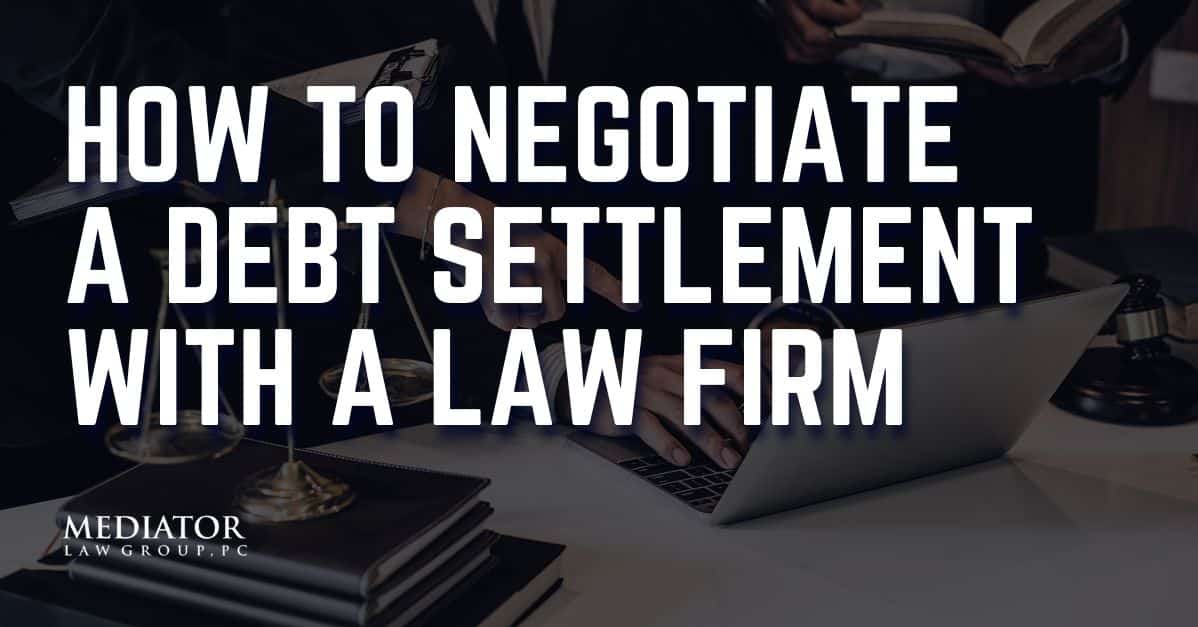Dealing with overwhelming debt can be stressful, especially when creditors are calling nonstop. Many people wonder if they should attempt debt settlement on their own, or if working with a law firm can make a difference. The truth is that understanding how to negotiate a debt settlement with a law firm may be the key to better results, greater peace of mind, and long-term financial recovery.
Why Law Firms Have More Leverage
While debt settlement companies can negotiate balances, they don’t have the same authority or protections that law firms provide. Attorneys can use California and federal consumer protection laws to ensure fair treatment and can defend clients if lawsuits arise. This added legal leverage often results in stronger settlements, reduced harassment, and more sustainable outcomes.
Steps in a Law-Firm-Led Negotiation
A debt settlement negotiation led by a law firm usually follows these steps:
- Case Review: Attorneys evaluate your debt, income, and financial goals.
- Strategy Development: A personalized settlement plan is created.
- Creditor Communication: Attorneys contact creditors directly, using legal leverage to push for reduced balances or interest.
- Settlement Agreements: Negotiated terms are documented and enforced.
- Ongoing Support: Lawyers ensure creditors comply with agreements and protect you if legal action is attempted.
This structured approach gives clients confidence that every angle of their financial situation is being addressed.
Examples of Successful Settlements
At Mediator Law Group, we’ve helped California clients achieve substantial savings through attorney-led negotiations. For example, some clients have reduced credit card balances by up to 50% and secured affordable payment plans that prevented bankruptcy. Each case is unique, but the consistent factor is that legal representation brings stronger results than going it alone.
When to Consider Legal Help
You should consider legal help if:
- You are facing potential lawsuits or wage garnishments.
- Your debt involves multiple creditors or large balances.
- Creditors are harassing you or violating consumer protection laws.
- DIY negotiations have failed or feel overwhelming.
Working with a law firm provides both peace of mind and the assurance that your rights are protected every step of the way.
Take the Next Step
If you’re wondering how to negotiate a debt settlement with a law firm, now is the time to take action. Contact Mediator Law Group today to schedule a consultation and explore your options for attorney-led debt settlement.
FAQ Section
- Do law firms charge more for debt settlement than companies?
Not always. While fees may differ, law firms provide legal protection and enforceable settlements that companies cannot. This extra security often makes attorney-led negotiation more cost-effective in the long run. - Can a lawyer stop creditor harassment?
Yes. Attorneys can invoke California’s Rosenthal Fair Debt Collection Practices Act and federal laws to stop harassment and unfair collection practices. This provides immediate relief and allows clients to focus on rebuilding financially. - What debts can a law firm negotiate?
Law firms typically handle credit card debt, personal loans, medical bills, and other unsecured debts. They also assist when creditors escalate to lawsuits, providing defense alongside settlement negotiations. - How long does debt settlement negotiation take with a law firm?
It varies, but most settlements are reached within a few months to a year. The timeline depends on creditor cooperation, the amount of debt, and your financial situation. Attorneys work to resolve cases as efficiently as possible. - Is attorney-led debt settlement better than bankruptcy?
For many people, yes. Bankruptcy has long-term credit consequences, while debt settlement allows for reduced balances without total financial collapse. An attorney can help determine which option fits your situation best.








